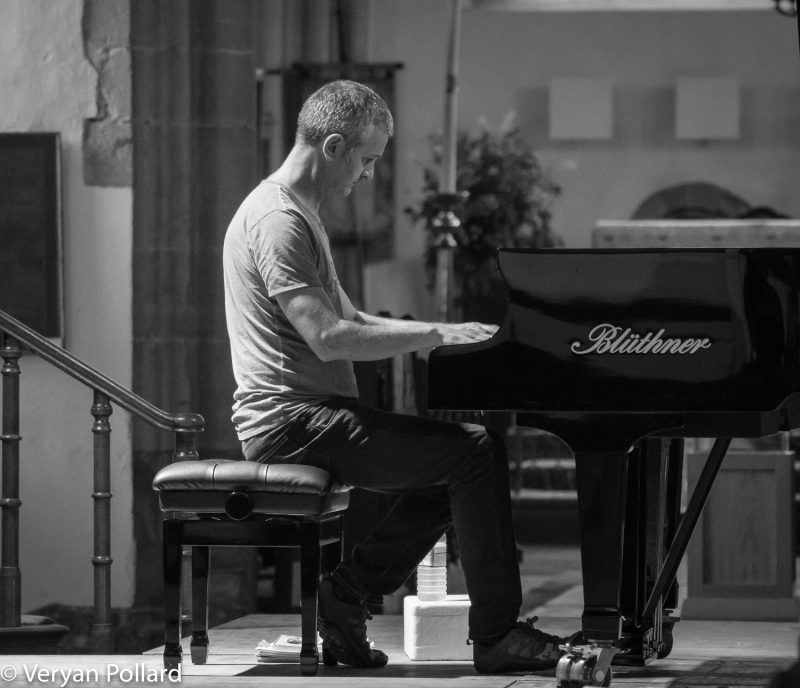Harpsichordist, organist, violinist, violist, composer and ice-cream connoisseur, Daniel Grimwood is also, and perhaps most importantly, a master pianist, as all who were fortunate enough to hear his Rye Arts Festival recital at St Mary’s on the evening of September 27 will attest. Beginning with the piano original of the more usually heard Berlioz orchestration of Weber’s Invitation to the Dance, all were aware from the outset that this would be a quite unforgettable and magical event, with this work’s quiet coda, after much emotional variety, surprising one or two.
Weber’s second piano sonata, a work filled with a variety of daunting difficulties followed and though Daniel conquered the formidably testing elements of all four movements, he also ensured that the beauty and lyricism of the work was fully presented, an impressive feat indeed. We need to add scholar and musical historian to this artist’s remarkable range of accomplishments, because he closed the concert’s first half with a ballad by the now almost forgotten but once revered 19th-century composer Adolf von Henselt, who in his day was thought the equal of Chopin and Liszt.
Almost single-handedly, Daniel has brought von Henselt’s music back to public attention and his playing of this piece bore witness to the very high musical quality as well as the pianistic difficulty of the compositions, more of which can be heard on his Henselt Edition Peters CD. In the recital’s second half, Chopin’s Barcarolle and Liszt’s 12th Hungarian Rhapsody, neither of them without complex difficulties, preceded the fiendishly hard Sonata No 2 (1913 version) by Rachmaninov, whose teacher Zverev had been a pupil of von Henselt. I have never warmed to Chopin’s Barcarolle for some unaccountable reason but here it was played at a slightly greater speed than usual with its poetic qualities fully realised and my previous long-standing error was made very clear to me.
The Liszt rhapsody made a dazzling impression in Daniel’s hands, its passion and drama rendered unforgettably, but the power and intensity of the Rachmaninov sonata was perhaps the high point of a quite exceptionally compelling evening. Its three intriguing, mystifying and emotionally draining movements played without a break, made the deepest possible impression on the audience, though the serious mood was lifted by the delightful contrast of a rippling Chopin etude as an encore. Although this concert powerfully impressed by its technical brilliance, the poetry, beauty and reflectiveness of much of the music was faithfully conveyed by a soloist of remarkable talent.
This was the last concert in St Mary’s to be overseen by Peter Brice, who is standing down, after eight years, from his role as co-ordinator of the Festival’s classical music concerts. He has done a truly magnificent job, tempting pianistic giants such as Nikolai Demidenko and Angela Hewitt to Rye, together with any number of other brilliant soloists. World famous ensembles such as the English Concert and La Serenissima have entranced us all, together with other renowned groups too numerous to mention.
Despite the overall excellence of his programming, two of Peter’s ideas deserve special mention. His introduction to the Festival of Euphonia and their extraordinarily talented director Alisdair Kitchen provided all of us with an immense variety of musical experiences, with our imagination and emotions stirred in eighteenth century Spain, in a haunted 19th-century country house and in wartime Paris, among other places. Peter also introduced, a year or two ago, the young Piatti String Quartet as a quartet in residence and this marvellously talented group responded by giving us conventional concerts, including a world premiere, a master class and a treat of an event in the Landgate’s Queen’s Head called Beer and Beethoven. All music lovers in the area are in Peter’s debt and we are fortunate that his successor is to be Alison Moncrieff-Kelly, a professional musician, who is the ideal person to ensure the on-going excellence of the Festival’s classical offering. We welcome her and wish her every good fortune in her future efforts on our behalf.




Adolf Henselt was one of the most remarkable pianists in history. His two sets of Etudes Op. 2 and Op. 5 are on par with those of Chopin. His Concerto is a magnificient work work of the 19th century. There is probably no greater contributor to the 19th century of Russian piano playing than Adolf Henselt.